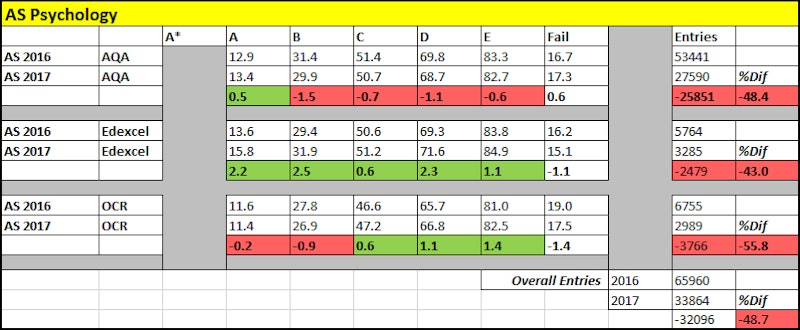In the News
One Year On. What’s happened to AS Psychology?
17th August 2017
This time last year teachers and students were worried about the first ever AS Psychology results. However, one year later and many teachers are moving away from AS examinations and opting for a linear approach. But what do the numbers tell us about the state of AS Psychology…
Overall Entries
It’s no surprise that AS entries have plummeted, but the decline was certainly more significant than expected. This year, AS entries have halved, with all three of the major exam boards experiencing significant losses. Again, OCR experienced the largest decline, with a reduction of 55.8% of their total AS entries. AQA maintain their market lead at AS, holding onto 81% of the market share, following by Edexcel at 10% and OCR at 9%.
The decline of AS can be attributed to a number of factors:
- Schools opting for a genuinely linear approach
- The need to significantly cut costs (AS entries are a big drain on school funds)
- Centres encouraging students to take three, not four subjects from the start of Year 12

Please note that these figures are taken from the provisional results and are subject to change, albeit slightly.
Results
The results of 2017 are broadly similar to 2016. For AQA, there was a small increase in the number of top grades; however, the percentage of students achieving B-E grades fell slightly, resulting in a slight increase in this year’s failure rate.
Edexcel saw an increase in all grades, especially at the top end, while OCR saw a fall in the top grades (A-B) and a slight increase everywhere else. Interestingly, OCR has still has the lowest A-C pass rate, which is nearly 4% lower than AQA and Edexcel.
Grade Boundaries
While the results look comparable to last year, the biggest surprise came from the grade boundaries which dropped significantly. Using AQA as an example, each grade boundary was 3-5 percentage points lower this year, in comparison to 2016. Naturally, it is reasonable to assume that the grade boundaries would increase slightly with the second sitting of an exam; however, this decline raises a number of questions…
Are the lower grade boundaries a sign that this year’s AS paper was more difficult? Or is it that students are aware that their AS grade no longer counts towards their full A-Level? Only time will tell.
What we do know is that teaching the AS content is fiendishly difficult, as teachers are faced with teaching approximately two-thirds of the entire content in one year. Also, the time lost in potential exam leave and public examinations is time that could be well spent developing the skills required for the linear A-Level which is, arguably, what matters!

What’s Next?
- An overview of the A Level Psychology headline figures
- A breakdown of the AS and A Level Psychology grade boundaries by exam board and paper
- Our detailed analysis of the A Level Psychology by paper, topic and question type
This entry will be followed-up with a series of entries unpicking the strengths/weaknesses of the new AS Level papers and what we can do to support our students in September. Make sure that you are subscribed to email updates to receive an email notification when we publish more Psychology news.
You might also like

A Level Psychology Depts - Behind the Numbers
29th October 2015

Anxiety - the Life-Saving Sixth Sense?
29th December 2015

CBT Can Help With Dental Phobia
29th December 2015

Who are England's Largest A Level Psychology Departments
23rd May 2016
Stressed Over A-Level Results Day?
18th August 2016
tutor2u Psychology – Weekly Update (22 Aug 2016)
22nd August 2016
Are You Hard Wired for Addiction?
31st August 2016